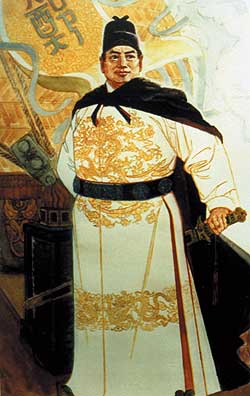Julius Caesar: "Well"
Interviewer: "Do you think you would mind telling me how you ended the Roman Republic?"
Julius: "No, I would not. Shall I start from the beginning?"
Interviewer: "Sure"
Julius: "I was born in 100 B.C. in a patrician family, meaning we were of a land-owning upper class that was involved in the Senate. I spent my childhood in Asia Minor and returned to Greece in 73 B.C. I was a pontifex, or priest, and climbed from military tribune to quaestor. When my wife and Aunt died, I broke the tradition of not having women public funerals. With that, people began to notice my political importance. I later followed the agitation of northern Italian Latin colonies for Roman citizenship and supported Pompey the Great. Pompey, Marcus Crassus, and I later formed the First Triumvirate. I gained a lot of respect in that time period, including Cicero and Cato the Younger. I was then a praetor and, although in some financial troubles, focused my attention on Spain and other tribes. A lot of cash was made after that project. Eventually, I was elected consulship in 58 B.C."
Interviewer: "Is that the election that you cheated and used physical force to persuade your followers?"
Julius: "Let me continue my story! Where was I? Yes, I had just put the First Triumvirate into action and had all my allies-supporters put in their proper position in the government. Now, by then people were starting to tell that I did not like their republic laws. Some even tried to persecute me! They failed, of course, but I moved onto a more violent stage in my career. I ran a great Roman army, called legions, in which had the whole country fearful. Then, in 55 B.C. my old buddies Pompey and Crassus joined me in the consul. Unfortunately, Crassus died, Pompey was kept away from me, and my five year term was coming to an end. In 49 B.C., I crossed the Rubicon River, showing that I meant war and no laws were going to stop me. Many battles and thousand of Romans later, I had finally destroyed the republic.One ironic thing is that the leader of the Republicans was Pompey"
Interviewer: "Hmm, and that was last year, wasn't it?"
Julius: "Yes, 45 B.C."
Interviewer: "And here you stand, the current dictator of Rome until you die."
Julius: "Until I die-I guess you could say that."
Interviewer: "So Julius Caesar, why would you say you are important to Rome's history?"
Julius: "Did you not hear me? I ended the Republic and I was a major political figure."
Interviewer: "Aha well thank you for the interview"
Julius: "You're welcome"
March 14th 44 B.C. Julius Caesar is assassinated by his senate members.
("Julius Caesar." World History: Ancient and Medieval Eras.












